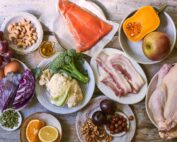Foods to Help Hormonal Imbalance: A Holistic Approach to Feeling Like Yourself Again
If you’re tired of feeling “off”—exhausted, foggy, moody, and stuck with stubborn weight—your hormones might be whispering (or screaming) for help. For women navigating perimenopause, menopause, or postmenopause, this is more than a phase. It’s a physiological shift that can derail your energy, weight, mood, and sleep. But there’s good news: food can be your ally in restoring harmony.
At The Feel Good Again Institute, we believe that food is medicine and a powerful tool in rebalancing hormones naturally. Here’s a motivating and actionable guide to support your hormones with the right nutrition—based on science and proven results.
Why Food Matters in Hormonal Health
Hormones are chemical messengers that impact everything from your metabolism and mood to libido and memory. As estrogen and progesterone fluctuate or decline (as they do in perimenopause and menopause), symptoms can arise like hot flashes, weight gain, anxiety, fatigue, and brain fog. But what you eat can either fan the flames or calm the storm.
Let’s look at the best foods to help balance hormones naturally.
-
Cruciferous Vegetables for Estrogen Detox
🌱 Broccoli, cauliflower, Brussels sprouts, kale, arugula, cabbage
Cruciferous vegetables are rich in indole-3-carbinol (I3C) and diindolylmethane (DIM)—natural compounds that support the liver’s detox pathways and help break down excess estrogen into non-toxic byproducts.
📖 Studies show that brassica vegetable otherwise known as cruciferous vegetable extracts support estrogen metabolism and reduce breast cancer risk markers. 1,2
Tip: Aim for at least one serving of cruciferous vegetables daily—raw, roasted, or steamed.
-
Healthy Fats to Fuel Hormone Production
🥑 Avocados, wild salmon, olive oil, flaxseeds, walnuts
Your body needs fat to make hormones. Omega-3 fatty acids reduce inflammation and help regulate cortisol and insulin—two hormones that affect mood and weight.
🧠 Estrogen also improves brain function and insulin sensitivity, protecting against Alzheimer’s and weight gain. 3
Tip: Add 1 tablespoon of flaxseed to smoothies, sprinkle walnuts on salads, and cook with avocado or olive oil. Try eating salmon or avocado at least one time a week.
-
Protein to Stabilize Blood Sugar
🍗 Lean poultry, fish, eggs, legumes, hemp seeds, collagen
Fluctuating blood sugar wreaks havoc on your adrenal glands and cortisol levels, leading to fatigue, cravings, and belly fat. Protein balances blood sugar and supports muscle mass—which naturally declines in midlife.
🧬 Protein intake is crucial in reducing sarcopenia, maintaining insulin sensitivity, and managing appetite-regulating hormones.4,5
Tip: Eat a palm-sized portion of protein at each meal to keep energy stable and reduce cravings.
-
Fiber for Estrogen and Toxin Elimination
🍎 Apples, pears, oats, lentils, chia seeds
Soluble fiber binds excess estrogen in the gut and ensures it’s excreted rather than recirculated. 6 Constipation? You may be reabsorbing toxic estrogen breakdown products and worsening symptoms like bloating, breast tenderness, mood swings, weight gain and heavy periods.
Tip: Drink plenty of water and aim for at least 25g of fiber daily.
-
Herbs and Spices that Support Balance
🌿 Turmeric, ginger, cinnamon, rosemary
These natural anti-inflammatories enhance liver function, improve insulin sensitivity, and support detox. Turmeric, in particular, has been shown to improve mood and reduce systemic inflammation. 7
🔬 Cinnamon helps regulate blood sugar and reduce insulin resistance—key in managing weight gain during menopause.8
-
Limit Foods That Disrupt Hormones
❌ Refined sugar, alcohol, caffeine, processed meats, soy isolates, non-organic dairy
These foods can spike insulin, burden your liver, disrupt gut health, and stimulate estrogen receptors unnaturally. Alcohol worsens hot flashes and affects estrogen metabolism.
Tip: Swap soda for sparkling water with lemon and switch sugary snacks for a handful of almonds and berries.
Your Next Step: Feed Your Hormones, Fuel Your Life
You don’t have to settle for feeling tired, foggy, or moody. With the right nutrition, you can calm the chaos and support your body’s natural rhythm. This isn’t about restriction—it’s about nourishment.
✨ Want more guidance tailored to your symptoms and goals? Take The Anti Aging Solution: Conquer Cortisol, “The Major Ager”, for Ideal Energy, Weight, Mood, Mental Clarity, Sleep and More! DIY online course. This is the foundation for overall health. If you want to go even deeper and save money, take our 3 course bundle, The Ultimate Hormone Reset: Look and Feel Slim, Sharp, Sexy and Supercharged at Any Age! You deserve to feel vibrant, focused, and energized again starting with what’s on your plate.
References:
- Fowke JH, Longcope C, Hebert JR. Brassica vegetable consumption shifts estrogen metabolism in healthy postmenopausal women. Cancer Epidemiol Biomark Prev Publ Am Assoc Cancer Res Cosponsored Am Soc Prev Oncol. 2000;9(8):773-779.
- Kabat GC, Chang CJ, Sparano JA, et al. Urinary estrogen metabolites and breast cancer: a case-control study. Cancer Epidemiol Biomark Prev Publ Am Assoc Cancer Res Cosponsored Am Soc Prev Oncol. 1997;6(7):505-509.
- Rettberg JR, Yao J, Brinton RD. Estrogen: a master regulator of bioenergetic systems in the brain and body. Front Neuroendocrinol. 2014;35(1):8-30. doi:10.1016/j.yfrne.2013.08.001
- Beaudry KM, Devries MC. Nutritional Strategies to Combat Type 2 Diabetes in Aging Adults: The Importance of Protein. Front Nutr. 2019;6. doi:10.3389/fnut.2019.00138
- Beasley JM, Shikany JM, Thomson CA. The role of dietary protein intake in the prevention of sarcopenia of aging. Nutr Clin Pract Off Publ Am Soc Parenter Enter Nutr. 2013;28(6):684-690. doi:10.1177/0884533613507607
- VA.gov | Veterans Affairs. Accessed May 9, 2025. https://www.va.gov/WHOLEHEALTHLIBRARY/tools/estrogen-dominance.asp
- Zhou X, Afzal S, Wohlmuth H, et al. Synergistic Anti-Inflammatory Activity of Ginger and Turmeric Extracts in Inhibiting Lipopolysaccharide and Interferon-γ-Induced Proinflammatory Mediators. Molecules. 2022;27(12):3877. doi:10.3390/molecules27123877
- Qin B, Panickar KS, Anderson RA. Cinnamon: Potential Role in the Prevention of Insulin Resistance, Metabolic Syndrome, and Type 2 Diabetes. J Diabetes Sci Technol. 2010;4(3):685-693. doi:10.1177/193229681000400324





She is a recognized and award-winning holistic, functional, integrative and anti-aging healthcare practitioner, speaker and author, and has been featured in ABC News, Forbes, WOR Radio and many media outlets to spread the word that you can live younger and healthier at any age.